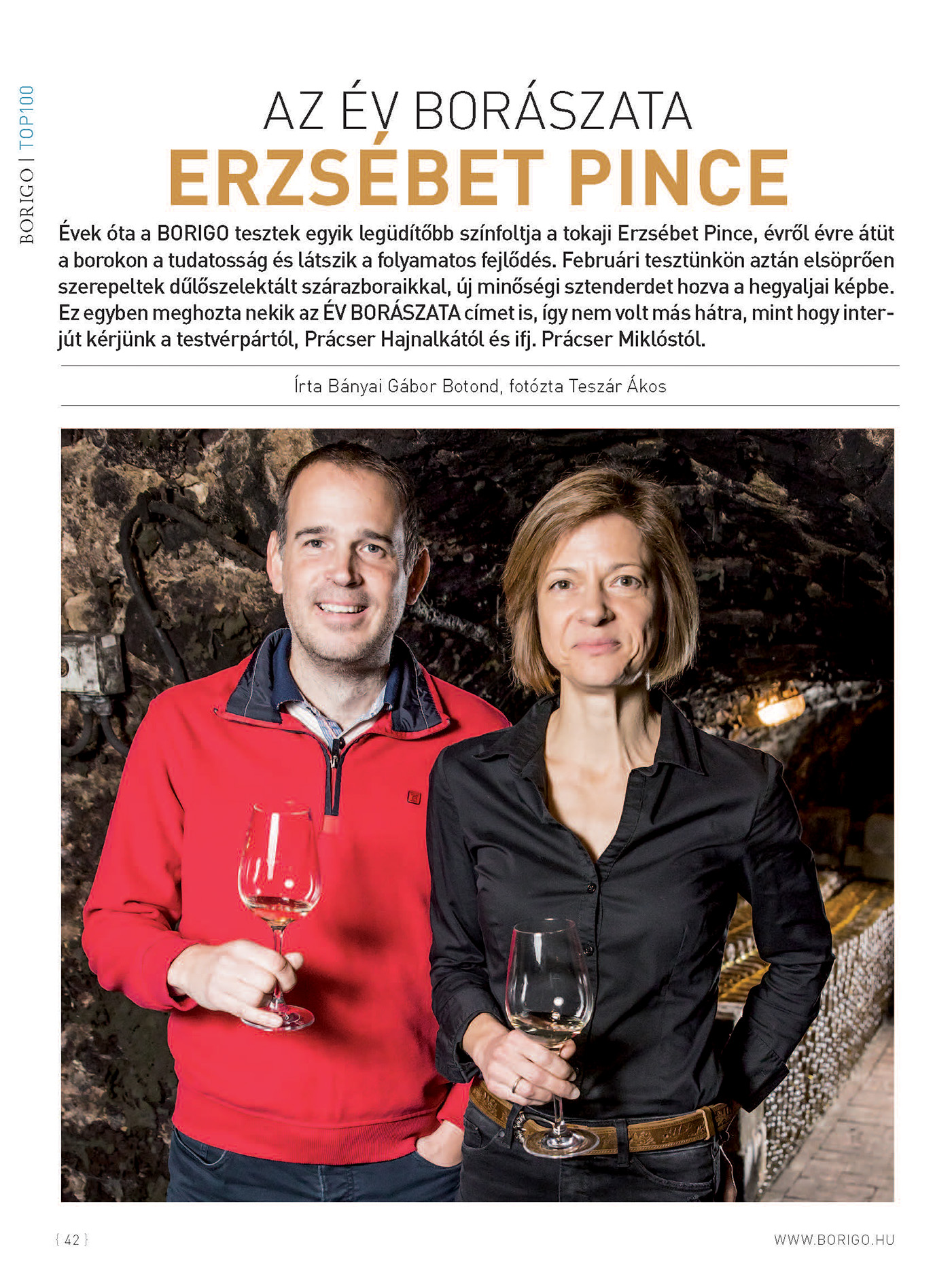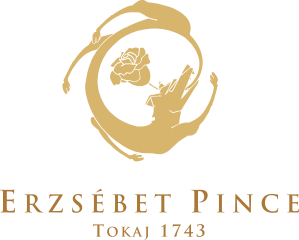
by Gábor Botond Bányai (GBB), photos by Ákos Teszár
For years, one of the most refreshing aspects of BORIGO tastings has been Erzsébet Cellar in Tokaj, whose wines have shown continuous improvement. Then in our February tastings—overwhelmingly, with their single vineyard dry wines—the winery brought a new quality standard to the Tokaj foothills. It also gave them the title of WINERY OF THE YEAR. So here is our interview with Hajnalka Prácser and Miklós Prácser Jr. from the winery. Hajni is winery manager, Miklós is winemaker and vineyardist.
GBB: Please introduce your winery.
HAJNALKA PRÁCSER: We have to start the story with our parents. They laid the foundation. They came to the wine region in 1974, after they graduated from Gyöngyös with degrees in winemaking and viticulture. They were immediately hired by the Borkombinat (regional wine cooperative). They started at the bottom, but they threw themselves into the work with enthusiasm, a trait they have never lost. Both of them have progressive personalities; they never blended into the system.
Our father is one of the wine region's most experienced wine professional. He helped establish Gróf Degenfeld winery in Tarcal in 1996, and was its general manager for 16 years. My mother made wines for the family from the 1993 vintage on. When the cellar at 16 Bem Utca went on the market, my parents bought it, and renovated it completely.
GBB: Why is the winery called Elizabeth Cellar?
HAJNALKA PRÁCSER: Our mother's name is Elizabeth. But more importantly, the cellar was leased by the Russian court in the 1700s under Tsarina Elizabeth, in order to store Aszú they purchased for the Russian court. They bought one hundred thousand liters of Aszú a year!
The first written record of our cellar is from 1660.
GBB: What year was your first Aszú,?
HAJNALKA PRÁCSER: 1993. Although we made Aszú before this, the 1993 was the first to be bottled. 1993 thus became the official founding date of the winery. In 2023, we will celebrate our 30th anniversary.
GBB: And when did both you join the winery?
MIKLÓS PRÁCSER JR: Officially in 2008, although obviously I was part of the winery pretty much my whole life. I graduated from university with an agricultural degree. Afterwards, I spent a year in the United States at the University of Minneapolis, as a plant researcher, then worked the harvest in Tokaj in 2008. Afterwards, I worked a harvest at Tapiz winery in Argentina. They owned 1,500 hectares of vineyards.
HAJNALKA PRÁCSER: After high school, I attended Debrecen University, where I studied American literature. Afterwards, I did an economics degree in Budapest. In 2006, I received a scholarship as a wine and food professional to work a year in the USA at a major wine company that owned wineries in both Napa Valley and Sonoma County. Only after this, in 2008, did I join the winery.
While in California, I met my husband, Ronn Wiegand, and came under his wine influence. [Ronn Wiegand is one of four people in the world who is both a Master of Wine and Master Sommelier – GBB]. Wine is our lives, and Ronn is always striving for excellence. At the winery, he encourages us to aim only for the highest possible quality wines; anything less is unacceptable. Ronn moved to Tokaj because he knew that I did not want to remain in California.
GBB: Did you join the winery willingly?
HAJNALKA PRÁCSER: Yes. In 2008, we made our first single vineyard wines, both Zafir (100% Harslevelu) and Kiraly (100% Furmint).
GBB: These single vineyard wines are legendary. At our Borigo tastings, they have been among the best wine for many years. Can you talk about your vineyards?
MIKLÓS PRÁCSER JR: Betsek is an original planting, from 1986. Kiraly was planted in 1992, and Zafir in 1999. These were done by my parents; without them, we would not be anywhere. We added 3 hectares in Veresek a few years ago, and now have 10 hectares of planted vineyards, out of a total of 15, including 4 unplanted hectares in Kővágó, which we think has great potential down the road.
HAJNALKA PRÁCSER: The vineyards and wines were developed step by step. In 2008, our concept was to improve and to focus more on quality. And it all came together 4 or 5 years ago.
GBB: Then it's no coincidence that at Borigo we have noticed the rapid development of your wines. How do you see further progress from here? Higher quality wines? More production?
MIKLÓS PRÁCSER JR: We don't really want to plant much more, but to produce more bottles from our own grapes (every year, we sell more than half of them to other wineries).
GBB: As already mentioned, the style and quality of your portfolio is very uniform across vintages. How do you do this?
HAJNALKA PRÁCSER: Our father grows outstanding grapes, and Miki is an excellent winemaker. In addition, we have Ronn, who is responsible for all blending. We are very fortunate to have him, because his knowledge and tasting experience is very apparent in the end results.
Few people here understand the critical role that blending can play in fine wine production. But Miki provides separate lots of quality wines that are made and aged in a variety of ways—different barrels, for example—so that Ronn has a wide range of resources to blend with. And Ronn invariably focuses on elegance; he does not like so-called rustic wines, which you can see in the finished wines.
MIKLOS PRÁCSER JR: The blending (which Hajni and I both participate in) is really surprising. I know the lab analysis of each lot. But when Ronn puts them together, in the end the blend is always the best wine, regardless of what the analysis shows. And in his blending, he also extrapolates the wine's future, taking into account how the wine will be, even 10 or 20 years later.
GBB: We see this in your wines, something we noted earlier this year, in February, when we felt for the first time that elegant, world class dry wines were finally being made in Tokaj. However, despite the quality of your wines, we hardly see them on the shelf, or in restaurants.
HAJNALKA PRÁCSER: That's true, at the moment. Most of our production is either exported or sold at the winery. We do not sell to many restaurants in Budapest. We have a lot of visitors at the cellar and our small pension also brings guests. In Tokaj, we also run a small coffeehouse, where we our wines sell pretty well. Year after year, the wines we make sell out. But because we sell a lot of our grapes, we could increase production a bit in the future.
In that regard, I have to mention the amazing recent developments in the region, where Route 37 has been improved, a 5-star hotel is being built, and so on. So presumably more visitors will come and also spend more time here, which will help local wine sales. And Tokaj's dry wines are helping enhance the region's international reputation; we get this feedback all the time.
GBB: We talked a lot about your dry wines. What about the sweets? Because they all do very well in our tastings.
MIKLÓS PRÁCSER JR: About 40% of our production is sweet wine. Not every year, of course, but over several years this the average, more or less. Apparently, the market is not growing for sweet wines, but for younger people really like the lesser ones. The Aszú, on the other hand, is very popular with tourists; that is what they buy most often to take with them. In 2019, before the pandemic, tourism was quite strong in the region, and while it is quiet now, it is certain to pick back up given all the improvements being made here, which we talked about.
HAJNALKA PRÁCSER: Quality tourism is the future of Tokaj: in this respect our potential has never been more exciting than now. ❦

 HU
HU  EN
EN 
